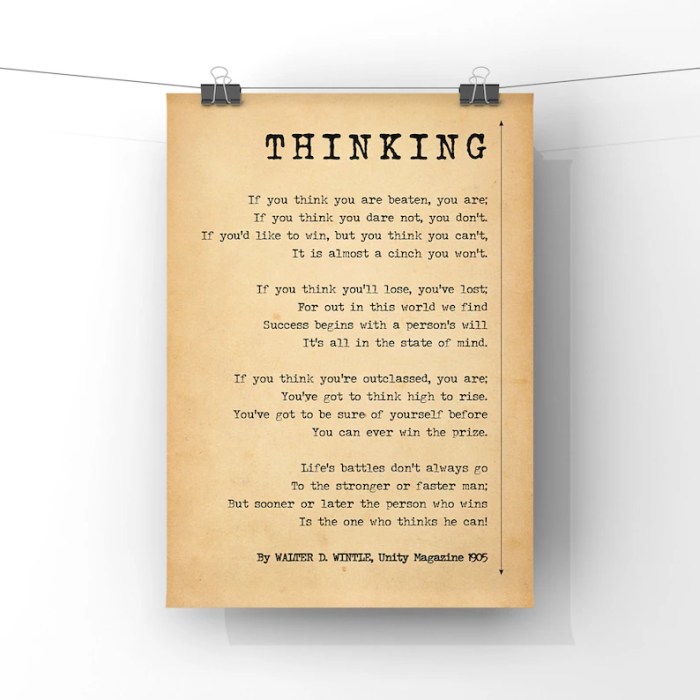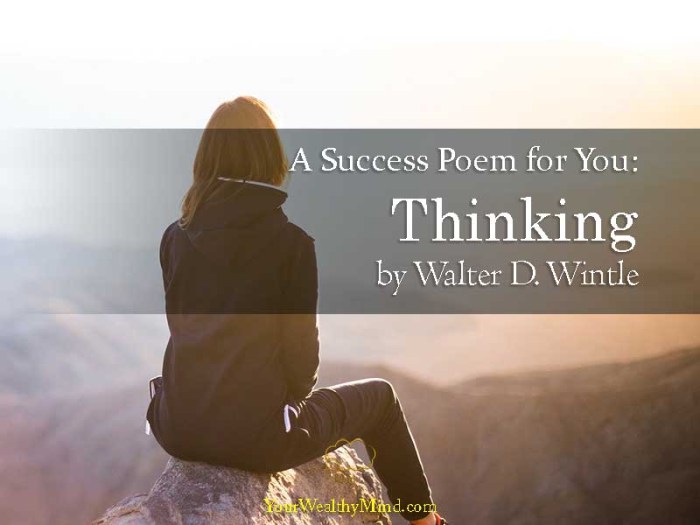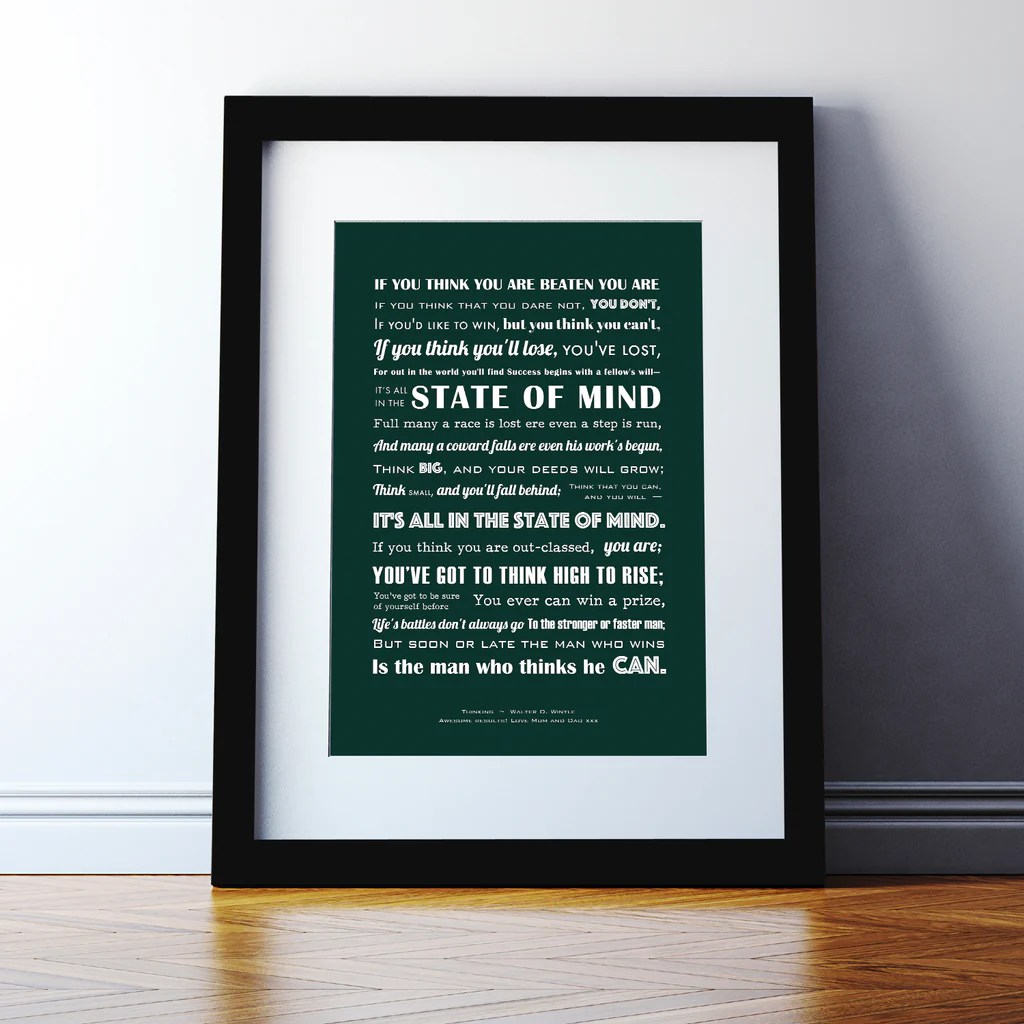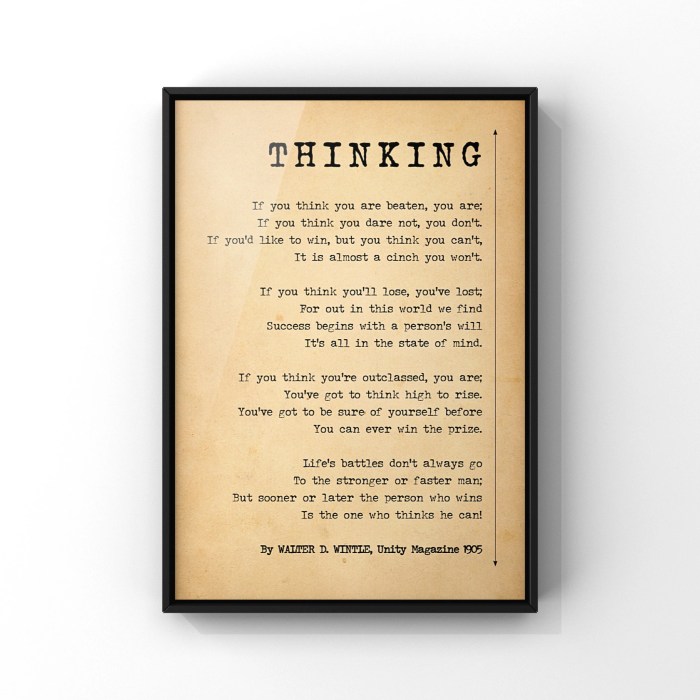Thinking by walter d wintle – Walter D Wintle’s “Thinking” invites us on an intellectual journey, exploring the intricacies of our thought processes and unlocking the power of critical thinking. Join us as we delve into Wintle’s framework for effective thinking, uncovering the secrets to enhanced cognitive abilities.
Through Wintle’s lens, we will unravel the concept of thinking, dissect its various types, and appreciate the profound role of language, logic, and creativity in our mental endeavors.
Introduction to “Thinking” by Walter D Wintle: Thinking By Walter D Wintle

Walter D Wintle’s “Thinking” delves into the complexities of human cognition, exploring the processes, methods, and obstacles involved in effective and critical thinking.
In the realm of thought explored by Walter D. Wintle, one might encounter a peculiar realm where the legendary Nemo might make an appearance . Wintle’s introspective musings delve into the labyrinthine corridors of the mind, where imagination and reality intertwine, blurring the boundaries of the conceivable.
Wintle aims to provide a comprehensive guide for readers seeking to enhance their thinking abilities, regardless of their background or level of expertise.
The Importance of Critical Thinking
In today’s rapidly evolving world, critical thinking has become an essential skill for navigating complex information, making informed decisions, and solving problems.
Key Concepts in “Thinking”

Walter D. Wintle’s book “Thinking” explores the multifaceted nature of human cognition. He defines thinking as “the mental process of manipulating information to reach a goal.” This process involves various types of thinking, each playing a crucial role in our cognitive abilities.
Types of Thinking
Wintle identifies several types of thinking, including:
- Deductive thinking:Drawing conclusions from general premises.
- Inductive thinking:Inferring general principles from specific observations.
- Analytic thinking:Breaking down complex information into smaller components.
- Synthetic thinking:Combining different pieces of information to form a coherent whole.
- Creative thinking:Generating new and original ideas.
Role of Language, Logic, and Creativity
Wintle emphasizes the importance of language, logic, and creativity in thinking.
- Language:Provides the symbols and concepts we use to represent and manipulate information.
- Logic:Allows us to organize and reason with information in a coherent and consistent manner.
- Creativity:Enables us to generate new ideas, solve problems, and adapt to changing circumstances.
The Process of Thinking

Thinking is a complex cognitive process that involves the manipulation of information in our minds. It is a dynamic and ongoing process that allows us to make sense of the world around us and to solve problems.The thinking process typically involves several steps:
- Perception:We take in information from our surroundings through our senses.
- Attention:We focus our minds on specific aspects of the information we have perceived.
- Memory:We retrieve relevant information from our long-term memory.
- Reasoning:We use logic and deduction to make inferences and draw conclusions.
- Judgment:We evaluate the evidence and make decisions.
Critical Thinking and Problem-Solving Skills
Critical thinking is the ability to think clearly and rationally about what to do or what to believe. It involves the ability to analyze information, identify biases, and evaluate evidence. Problem-solving skills are the ability to identify and solve problems.
These skills are essential for success in both personal and professional life.
The Role of Intuition and Imagination in Thinking
Intuition is the ability to make decisions or form judgments without conscious reasoning. Imagination is the ability to create mental images and scenarios. Both intuition and imagination play a role in thinking, as they can help us to generate new ideas and to see problems from different perspectives.
Obstacles to Effective Thinking
Thinking effectively requires clarity of thought and objectivity. However, numerous obstacles can hinder this process, including biases, assumptions, and distractions.
Biases are preconceived notions that influence our perception and interpretation of information. They can lead to selective attention, where we focus on information that confirms our existing beliefs while ignoring or discounting evidence that contradicts them. Assumptions are beliefs that we take for granted without questioning their validity.
They can limit our thinking by preventing us from considering alternative perspectives.
Impact of Emotions and Personal Experiences
Emotions and personal experiences can also significantly impact our thinking. Strong emotions, such as fear or anger, can cloud our judgment and make it difficult to think rationally. Personal experiences can shape our beliefs and assumptions, potentially leading to biased or narrow-minded thinking.
Strategies for Overcoming Obstacles
Overcoming obstacles to effective thinking requires conscious effort and strategies. These include:
- Identifying and challenging biases:Recognize your own biases and be open to considering alternative viewpoints.
- Questioning assumptions:Regularly examine the validity of your beliefs and be willing to revise them if necessary.
- Managing emotions:Learn to regulate your emotions and prevent them from interfering with your thinking.
- Seeking diverse perspectives:Expose yourself to different opinions and viewpoints to broaden your understanding and challenge your assumptions.
- Practicing mindfulness:Pay attention to your thoughts and feelings without judgment, which can help you identify and address obstacles.
Applications of “Thinking” in Different Fields

The principles of thinking, as Artikeld by Walter D Wintle, can be applied across a wide range of fields, from science and business to education and personal development. Critical thinking is a fundamental skill in any field that requires decision-making, problem-solving, and effective communication.
Science
In science, critical thinking is essential for conducting research, analyzing data, and developing new theories. Scientists must be able to evaluate evidence, identify biases, and draw logical conclusions based on their findings. Critical thinking skills also enable scientists to communicate their research effectively and collaborate with others in their field.
Business
In business, critical thinking is crucial for making informed decisions, solving problems, and adapting to changing market conditions. Business leaders must be able to analyze data, identify opportunities, and develop strategies that will lead to success. Critical thinking skills also help business professionals to negotiate effectively, manage teams, and communicate their ideas clearly.
Education, Thinking by walter d wintle
In education, critical thinking is essential for both students and teachers. Students need to be able to think critically in order to learn effectively, analyze information, and develop their own ideas. Teachers need to be able to think critically in order to design effective lesson plans, assess student learning, and create a positive learning environment.
Critical thinking skills also help educators to collaborate with colleagues, adapt to new technologies, and stay up-to-date on best practices.
Personal Development
Critical thinking is also essential for personal development. It helps individuals to make informed decisions about their lives, solve problems effectively, and achieve their goals. Critical thinking skills also enable individuals to communicate their ideas clearly, build relationships, and live a more fulfilling life.
Conclusion
Walter D. Wintle’s “Thinking” concludes by emphasizing the paramount importance of developing and enhancing our thinking skills. The book underscores that critical thinking is not a static ability but rather a dynamic process that requires continuous cultivation and practice.
The Significance of Thinking in Human Development and Progress
Thinking is the foundation upon which all human progress and development rests. It enables us to solve problems, make informed decisions, and adapt to changing circumstances. Through thinking, we create knowledge, innovate new technologies, and shape our world.
Call to Action for Enhancing Thinking Skills
Wintle urges readers to take an active role in developing their thinking skills. He encourages us to question assumptions, challenge our beliefs, and seek out diverse perspectives. By engaging in critical thinking exercises, practicing mindfulness, and seeking knowledge continuously, we can enhance our ability to think effectively.
By embracing the principles Artikeld in “Thinking,” readers can cultivate a mindset that values critical thinking, embraces intellectual curiosity, and recognizes the importance of lifelong learning. This will empower them to navigate the complexities of the modern world and make meaningful contributions to society.
FAQ Insights
What is the central theme of “Thinking” by Walter D Wintle?
The book explores the nature of thinking, its processes, and the importance of critical thinking for effective decision-making and problem-solving.
How does Wintle define “thinking”?
Wintle defines thinking as the process of using our minds to generate, evaluate, and communicate ideas.
What are some common obstacles to effective thinking identified by Wintle?
Wintle discusses biases, assumptions, distractions, and the influence of emotions and personal experiences as potential obstacles to clear and rational thinking.
How can we overcome these obstacles to enhance our thinking skills?
Wintle suggests strategies such as questioning assumptions, seeking diverse perspectives, practicing mindfulness, and engaging in critical self-reflection.